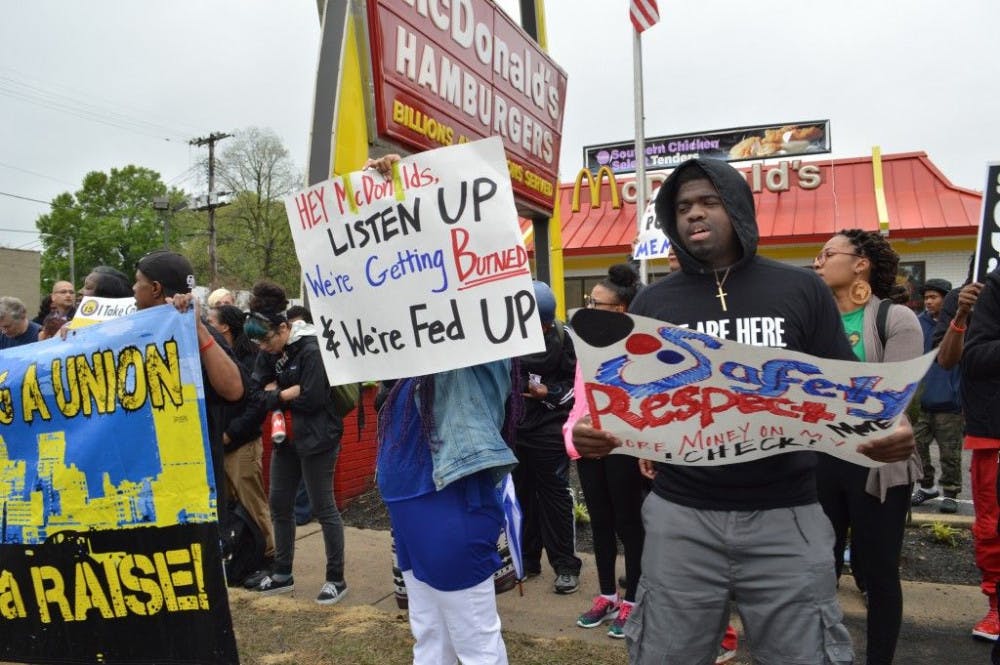Students and workers at the University of Memphis joined a nationwide protest Wednesday, seeking to shame fast food restaurants into paying employees at least $15 an hour.
More than 50 fast food and other low-wage workers marched from the student plaza to the McDonald’s on Highland for the “Fight for 15” campaign.
Ashley Cathy, a fast-food worker who marched in the demonstration, said making ends meet is nearly impossible on the state’s $7.25 an hour minimum wage.
“When you are a multi-million dollar company and bringing in so much revenue, it is unacceptable to pay the workers so little,” she said.
Two weeks ago, McDonald’s announced all company-owned restaurants would raise minimum pay from $9.01 to $10.00, but protestors said they want to make bigger strides.
Marchers chanted, “We can’t survive on $7.25” while holding signs that read, “Show me 15 and a union.” The group was just one of several protesting across the country, choosing April 15 to highlight the $15 an hour goal.
The event was sponsored and organized by the Memphis Progressive Student Alliance, a group that reaches out and partners with community and justice organizations.
The demonstration quickly moved from the student plaza into the University Center, home of the student government office and Office of Student Affairs.
With megaphones and banners, the group entered into the main food hall and chanted “Come on out, we’ve got your back” to the U of M’s food workers.
Campus police services were quick to ask group’s leaders to leave at this point. Bruce Harber, campus chief of police, watched from the doors of the UC as the group marched to McDonald’s.
“We asked them to leave,” Harber said. “They were in violations of their permit,” which only allowed the group to demonstrate within the student plaza. “They were polite. They left when we asked.”
Representatives from United Campus Workers, Tennessee’s Higher Education Union, the Home Healthcare Fight for $15, and many others were present. Lindsey Smith, president of the progressive student alliance, marched with workers and helped organize the event.
Smith said the fight for fair wages was extremely important.
“Raising minimum wage would help people living in poverty,” she said. “This is a response to a social change that is happening across this country and it is important that people know about it.”
Smith and other alliance members delivered a list of demands to U of M President David Rudd on the day of the protest. Central to their demands was that the U of M pay all workers at least $15 an hour.
In the mean time, they asked that all campus employees who are still earning state minimum wage be paid $10.10 — to match all full time and “in house” employees.
They also requested that the University recognize the United Campus Workers as the official union of the U of M.
“The letter is a basically a plea to the president to give workers this higher-wage incentive and understand what we’re asking for,” Lindsey said. “Not only would this benefit workers, but our city as a whole.”
The protestors moved on from the University Center down Walker Avenue chanting “Whose streets? Our streets. Who shuts sh-- down? We shut sh-- down.”
Police were lining Walker waiting to act in case the protestors violated the terms of their permit. Leaders in the demonstration said that police would end the protest if they walked into the street.
Storeowners on Walker came outside to watch and take pictures of the protests. Cars passed by and honked their horns in support of the protestors.
The protestors turned left on Highland toward the McDonalds. Protest leaders were making sure that nobody left the confines of the sidewalk, but also made sure that everyone crossed the street in a slow manner to disrupt traffic.
<blockquote class="twitter-tweet" lang="en"><p>The manager of the McDonald's is standing at the door not letting people in. <a href="http://t.co/mpNsrJw7Ml">pic.twitter.com/mpNsrJw7Ml</a></p>— Jonah Jordan (@jmj1757) <a href="https://twitter.com/jmj1757/status/588369995228258305">April 15, 2015</a></blockquote>
<script async src="//platform.twitter.com/widgets.js" charset="utf-8"></script>
While on Highland, the protestors set up shop at the McDonalds across from the Family Dollar store.
Police met protestors at the McDonalds. One officer yelled orders to the demonstrators while another directed traffic. Police also kept protesters off private property.
That was when protestors started chanting, “We got the blue flu too. No union. No racist police.”
The manager of the McDonalds locked their doors only opening to let people out of the fast food chain. Protestors trying to use the restroom were turned away. Onlookers trying to purchase food were not let through the locked doors either.
Demonstrators marched from the University of Memphis to McDonald's on Highland in a national protest for a living wage of $15 a hour. Protesters march on the sidewalk on Southern with the banner “Memphis needs a raise.” Photo by Sarah Fultz




